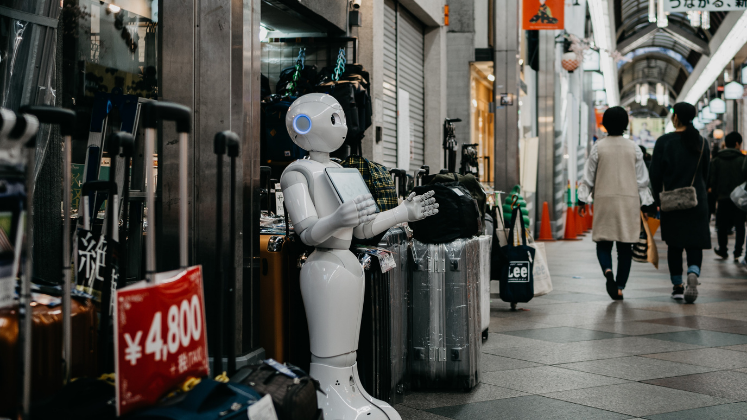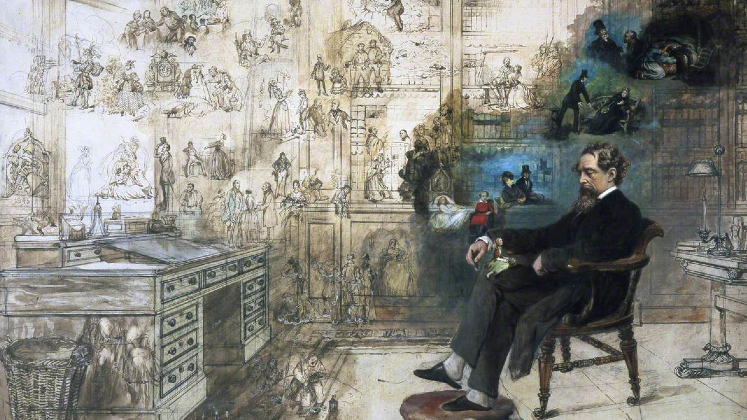AI is poised to reshape many sectors of our society and economy including higher education. However, the character of this future is often imagined from within particular academic silos or through what technologies can do rather than proven need. In this post, Andrew Cox describes how alongside his conventional research, he has used fictional narratives to explore future AI scenarios within the academy and to raise questions that cut across traditional conceptions of what AI can do for higher education.
In addition to academic papers, I also write fiction as an output of my research into the potential use of AI in Higher Education. My aim is that by presenting ideas through fictions it will help create a more inclusive debate about how AI could and should impact working and studying in Higher Education.
Fictions can vividly bring to life different futures and allow us to think not just about technological feasibility, or even the challenges of implementation, but open up the ethical issues and explore what we think about the possible impact on human lives. By being open-ended, fiction enhances the reader’s sense of agency to challenge or even rewrite the plot in a way that contrasts the more authoritative voice of the research paper.
Imagine these possibilities, some immanent, some more distant:
- An intelligent tutor personalising learning to reflect your students’ needs and monitoring their activities to assess them, rather than setting exams
- A chatbot helping you to support your students’ group work and reporting back to you
- A translating bot helping you to talk to a class who are in different parts of the world
- An app you helped design guiding students to plan their essays step by step
- A friendly robot who your students teach a new language, as a way for themselves to learn
- An AI that helps students monitor their time and prompts them to move if they have sat in the library for too long
- A robot table adjusting to your body when you sit down
- A voice assistant answering your questions about university regulations
- A robot scientist conducting hundreds of experiments a day in an entirely replicable way
- A digital assistant helping you write your papers and even being recognised as your co-author
- A robot mentor advising senior staff about unconscious bias
- The library as a living, lifelong learning companion
How might these possible technologies affect your students’ learning or your own teaching and research? What challenges would there be to implementing them in practice in institutions like universities? What other changes might follow if they were implemented? These possibilities might have a big impact on our daily life in higher education. But, it is hard to fully imagine what working in a world in which they have been realised might be like. Fiction can be a way to help us do so.
Automation and AI are also deeply contested. Personally, I believe they present many positive possibilities. However, as a recent review has demonstrated, most writing about AI, as applied to learning at least, is by computer scientists and neglects both ethics and pedagogy. Studies rarely think across the many applications in teaching and research, or even campus management. This raises the obvious risk of technological solutionism, or a future where the agenda is driven by technological applications in search of a problem, rather than one in which human value is carefully considered. It also underscores the particular value of stories and narratives as a means of cutting across traditional disciplinary divides.
Of all topics technological futures particularly invite a fictional response, because societies’ imaginaries of things like AI have already been strongly shaped by science fiction and speculative fiction
As society is becoming increasingly aware, automation also creates a host of issues of confidentiality and consent, bias, transparency and accountability, and human agency. Critics have linked the use of AI in education to datafication and metrification; to the commodification of learning and the growing power of EdTech companies; to surveillance including dataveillance. Not to mention the potential impact on the quality of jobs and the global environmental and human impact of the AI industry. The fictions I have written are a collection of fragments from contrasting storyworlds, from the near and further future, set in different contexts, across teaching, research and administration, and written in different genres. The imagining of multiple worlds within the collection seeks to escape the usual utopia/dystopia dualism. Rather than capturing one future or even articulating one moral stance, the fictions leave space for the reader’s imagination. This prompts engagement with all types of issues, not just technical feasibility. Fictions present a way to engage with these possibilities and help create an environment for responsible development and use of AI, without foreclosing the possibility that many uses of AI are simply not right in an educational context.
Shaping technological futures and the place of fiction in social science
Of course, I am far from the first researcher to perceive the value of fiction for social science. Indeed, there seems to be increasing interest in writing fiction among social scientists, such as in sociology, urban studies, and education. Researchers see the value of fiction’s ability to challenge dominant narratives and stereotypes, and promote empathy by giving access to the interior worlds of other social actors. Of all topics technological futures particularly invite a fictional response, because societies’ imaginaries of things like AI have already been strongly shaped by science fiction and speculative fiction. In the field of Human Computer Interaction (HCI) researchers have moved beyond traditional scenario writing, to explore possible or even impossible technologies through design fictions.
Creating fictions has allowed me to write things I could not have expressed in an academic text and in response the reader to think and feel different things. Exploring different genres of writing such as dialogue, soliloquy, and even the style of marketing material for imagined products presents a mode of writing touched with humour, emotion and even a little poetry, that might even enhance traditional academic writing. Fiction appears in different places from academic texts and can be used in many different ways. I have used fictions in the classroom to stimulate discussion. I am also asking students to write their own fictions. At the time of writing, I and a colleague have just presented a workshop for the Society of Research into Higher Education where participants co-created their own stories from a pre-given framework or story opening. Narratives thus have a range of uses and by releasing my own collection (open access) on my institution’s repository, I hope others too might benefit from them in their own research and to help envision a future in which AI serves the goals of higher education, rather than shaping it in it’s own technological image.
The fictions: AI and robots in Higher Education: Eighteen design fictions, are made available via the University of Sheffield. The research was funded by Society into Research in Higher Education (SRHE) and reported in The coming “intelligent university”? Exploring the potential impact of artificial intelligence (AI) and robots on UK Higher Education.
Note: This post gives the views of the authors, and not the position of the LSE Impact Blog, or of the London School of Economics.
Image Credit: Eric Krull via Unsplash.









Very interesting article prompting serious reflection to all educators.
Thank you for sharing,
Teresa Roca
AI in higher education? I can’t think of anything worse. Of course I have seen shows featuring AI worlds on Netflix and they never end well. In the degrowth world we need, there will be less technology, not more.